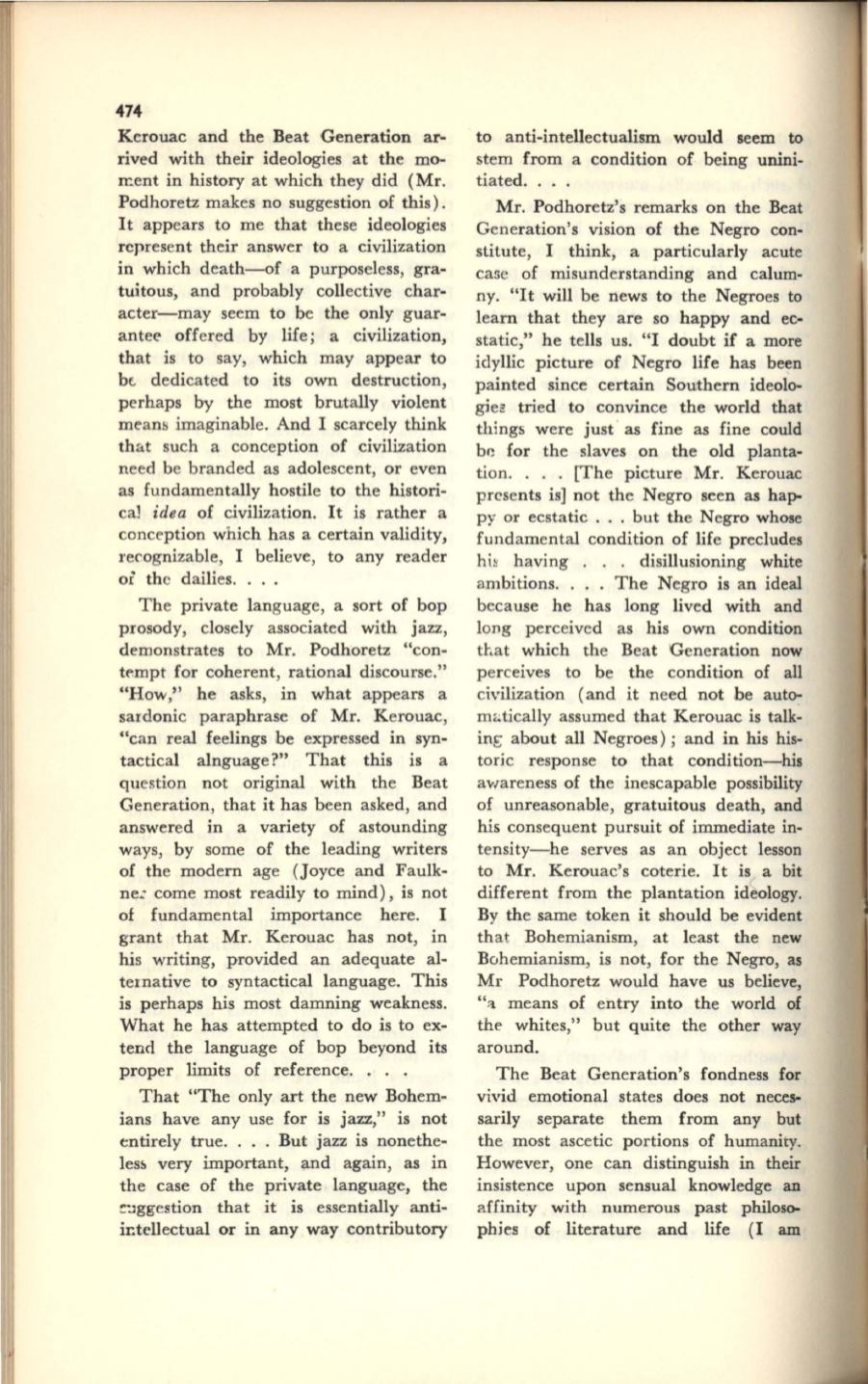
474
Kerouac and the Beat Generation ar–
rived with their ideologies at the mo–
n:.ent in history at which they did (Mr.
Podhoretz makes no suggestion of this ) .
It appears to me that these ideologies
represent their answer to a civilization
in which death-of a purposeless, gra–
tuitous, and probably collective char–
acter-may seem to be the only guar–
antee offered by life; a civilization,
that is to say, which may appear to
b(. dedicated to its own destruction,
perhaps by the most brutally violent
means imaginable. And I scarcely think
that such a conception of civilization
need be branded as adolescent, or even
as fundamentally hostile to the histori–
cal
idea
of civilization. It is rather a
conception which has a certain validity,
recognizable, I believe, to any reader
or the dailies. . ..
The private language, a sort of bop
prosody, closely associated with jazz,
demonstrates to Mr. Podhoretz "con–
te:mpt for coherent, rational discourse."
"How," he asks, in what appears a
sardonic paraphrase of Mr. Kerouac,
"can real feelings be expressed in syn–
tactical alnguage?" That this is a
question not original with the Beat
Generation, that it has been asked, and
answered in a variety of astounding
ways, by some of the leading writers
of the modern age (Joyce and Faulk–
ne: come most readily to mind), is not
of fundamental importance here. I
grant that Mr. Kerouac has not, in
his writing, provided an adequate al–
ternative to syntactical language. This
is perhaps his most damning weakness.
What he has attempted to do is to ex–
tend the language of bop beyond its
proper limits of reference. . . .
That "The only art the new Bohem–
ians have any use for is jazz," is not
entirely true.... But jazz is nonethe–
les& very important, and again, as in
the case of the private language, the
c:lggestion that it is essentially anti–
ir.tellectual or in any way contributory
to anti-intellectualism would seem
to
stem from a condition of being unini–
tiated....
Mr. Podhoretz's remarks on the Beat
Generation's vision of the Negro con–
stitute, I think, a particularly acute
case of misunderstanding and calum–
ny. "It will be news to the Negroes to
learn that they are so happy and ec–
static," he tells us. "I doubt if a more
idyllic picture of Negro life has been
painted since certain Southern ideolo–
gie2 tried to convince the world that
things were just' as fine as fine could
bl! for the slaves on the old planta–
tion. . . . [The picture Mr. Kerouac
presents is] not the Negro seen as hap–
py or ecstatic ... but the Negro whose
fundamental condition of life precludes
hi~
having . . . disillusioning white
ambitions.... The Negro is an ideal
because he has long lived with and
long perceived as his own condition
tr,at which the Beat Generation now
perceives to be the condition of all
civilization (and it need not be auto–
m~tically
assumed that Kerouac is talk–
inE; about all Negroes); and in his his–
toric response to that condition-his
awareness of the inescapable possibility
of unreasonable, gratuitous death, and
his consequent pursuit of immediate in–
tensity-he serves as an object lesson
to Mr. Kerouac's coterie. It is a bit
different from the plantation ideology.
By the same token it should be evident
that Bohemianism, at least the new
Bohemianism, is not, for the Negro, as
Mr Podhoretz would have us believe,
"'l
means of entry into the world of
the whites," but quite the other way
around.
The Beat Generation's fondness for
vivid emotional states does not neces–
sarily separate them from any but
the most ascetic portions of humanity.
However, one can distinguish
in
their
insistence upon sensual knowledge an
affinity with numerous past philoso–
phies of literature and life (I
am


